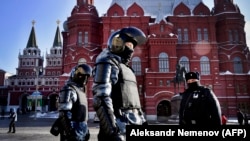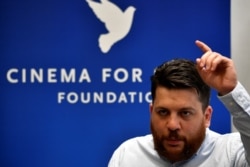On February 4, Leonid Volkov, aide to imprisoned Russian dissident activist Alexey Navalny, announced that Navalny’s activist network would be taking a break from organizing mass rallies to focus on September’s parliamentary elections.
Speaking during a YouTube live stream, Volkov assessed the results of the protests over Navalny’s incarceration held in cities across Russia in late January, which resulted in thousands of arrests.
“If we go out every week, thousands more will be detained, and hundreds more beaten,” Volkov said, as reported by The Moscow Times.
“The work of the regional headquarters will be paralyzed, and it will be impossible to work on elections. This is not what Alexey wants from us. Alexey has asked us to concentrate on this autumn.”
On February 9, Volkov announced a new protest action will take place on February 14 but will not be a street action. Instead, he asked supporters to stand outside their homes with their phone flashlights on from 8:00-8:15 p.m. Part of the reasoning, according to Volkov, is to avoid direct confrontations with police.
But Russian Foreign Ministry spokesperson Maria Zakharova saw something sinister. Zakharova asked rhetorically, via her personal Facebook account:
“What happened between February 4 and 9 and forced the ‘opposition’ to radically change tactics? Everything is nice and simple – on February 8, 2021, an online meeting with Volkov and Ashurkov [another Navalny aide] took place at the Permanent Mission of Poland to the EU in Brussels, in which EU countries, the United States and Britain took part. In essence, a meeting of NATO countries.The NATO members instructed the ‘opposition,’ and in fact their agents of influence, how to continue to conduct subversive work ‘more cunningly’.”
The assertion that NATO is directing Navalny’s supporters is false.
In his February 4 statements, Volkov explained the reasons for calling off mass street actions, specifically the need to preserve activists’ freedom ahead of parliamentary elections.
On YouTube, he also explained how the authorities’ recent repression against protesters could scare off many people who have only recently come to support the opposition. He also argued against the idea that the protests should become more radical because it would scare off potential supporters and “legitimize any sort of violence from the authorities.”
There was also no contradiction or change in tactics between Volkov’s announcements on February 4 and 9. On February 4, he said they would suspend street actions and instead act “more cunningly.” The phone protest set for February 14 - an idea borrowed from protesters in neighboring Belarus - is not a mass demonstration.
In other words, the opposition didn’t “radically change” its tactics after the virtual conference, as Zakharova claimed, but rather stuck to the plans announced on February 4.
Zakharova’s only “evidence” for the claim that Volkov was told to continue protests after February 4 is a screenshot of a tweet from the official Poland in the EU account (@PLPermRepEU), announcing the teleconference with Volkov and Ashkurov.
The tweet read: “The recent developments in (EU-Russia) relations require action from the #EU Member States. This is why (Poland) is hosting a virtual meeting with A.@Navalny's closest associates @LeonidVolkov & @Vashurkov. The EU27 PermReps alongside (the US, UK, Canada, and Ukraine) are now discussing the next steps.”
The tweet suggests that the “next steps” are the EU countries’ response toward Russia, not instructions or orders for Volkov and Ashkurov. Volkov later reported what was discussed during the conference on his social media accounts.The main topic was new EU sanctions against Russian President Vladimir Putin’s close allies.
“I see in a number of respected media outlets the phrase ‘sanctions against Russia’ in relation to the package of personal sanctions that Vladimir Ashurkov and I discussed today with representatives of the EU countries, and we will talk a lot further in the coming weeks and months,” Volkov wrote in a Twitter thread about the conference.
“These are sanctions against wallets and propagandists, the closest circle and support of Vladimir Putin. These are sanctions in the name of Russia, in its interests. Our goal is to identify and freeze assets consisting of tens and hundreds of billions of dollars stolen from the Russian people.”
Volkov’s accusations are in keeping with Navalny’s activism, which for years has consisted of blog and video investigations into luxury properties allegedly belonging to members of Putin’s inner circle. The most recent example, released after Navalny’s return to Russia, was a video investigation into a palatial compound on Russia’s Black Sea coast.
The Kremlin has denied that the property ever belonged to Putin, and on January 30, Arkady Rotenberg, a businessman and close associate of Vladimir Putin, claimed to be the real owner of the estate. The previous two official owners also had personal ties to the Russian president.
Volkov concluded his Twitter thread by saying that, judging by the Russian Foreign Ministry’s reaction to calls for sanctions targeting the wealth of Putin’s allies and associates, anti-Kremlin activists have hit a sore spot.






